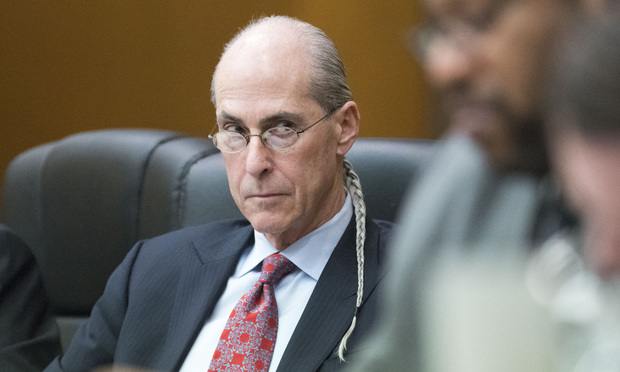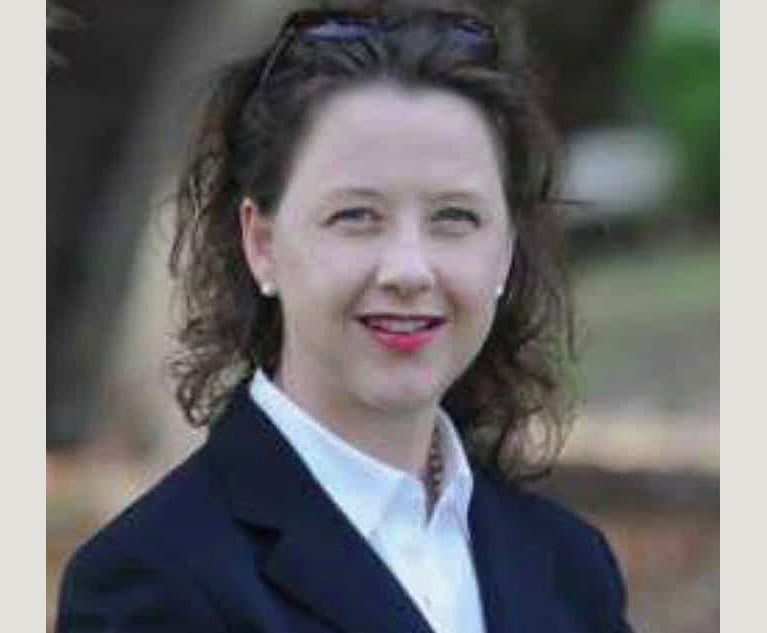Tex McIver Told Sole Witness to Shooting He 'Can't Go To Jail'
Dani Jo Carter, a longtime friend of shooting victim Diane McIver, testified Wednesday that she had witnessed a shoving match between Tex McIver and his wife months before he shot her.
March 21, 2018 at 01:38 PM
4 minute read

Dani Jo Carter, the sole witness to the 2016 fatal shooting of Diane McIver, on Wednesday told the jury hearing the murder case of Atlanta attorney Claud “Tex” McIver that he told her, “I can't go to jail.”
Carter said McIver made the comment while at Emory University Hospital shortly after he fatally shot his wife. McIver and his lawyers have always insisted Diane McIver's shooting was an accident—a conclusion Carter testified she believed at the time and had shared with Atlanta police.
Carter testified Wednesday that she had just returned to the hospital emergency room with her husband and rejoined McIver and Stephen Maples, an attorney he called minutes after they rushed Diane McIver to Emory's emergency room from Midtown Atlanta, bypassing several closer hospitals, including the city's two Trauma I facilities.
But attorney Bruce Harvey, a member of McIver's defense team, suggested Wednesday his client's comment was a reference to claustrophobia rather than an implication of guilt.
Carter was driving the McIvers' SUV, chauffeuring the couple home from a weekend at their 75-acre ranch on Sept. 2, 2016, when a traffic jam led her to exit the interstate in downtown Atlanta. McIver, sitting in the back seat, expressed wariness at the neighborhood and asked for his gun. A few miles north, while Carter was stopped at a red light, the gun fired, fatally wounding Diane McIver, who was sitting in the front passenger seat.
Before concluding her testimony Wednesday morning, after more than two days on the stand, Carter said she once witnessed Tex McIver shove his wife during a heated argument in 2016—an incident she never shared with police or prosecutors until March 18 while prosecutors were preparing her to testify at McIver's murder trial. Prosecutors did not share information on Carter's new revelation with McIver's defense team until Tuesday, and McIver's defense objected to its introduction.
Carter said the incident she witnessed stemmed from a mishap when the McIvers' godson, Austin Schwall, burned his finger at a fire pit at the couple's ranch. The boy, then 10, was hysterical, she said, and recalled icing the child's finger to ease his pain.
Later that night, after everyone went to bed, Carter said she was awakened by Austin's cries from the McIvers' master bedroom. She said the bag of ice she gave the child had leaked all over the couple's bed, that Diane had thrown it in the bathroom sink and that Austin was crying “because his finger was burning.”
Diane McIver was insisting that “there was nothing wrong” with Austin as Tex attempted to quiet her, Carter recalled. Then, she said, “They shoved each other. Tex kind of pushed Diane out of the bedroom and closed the door.” The McIvers “had been drinking,” Carter recalled.
Carter said she had never witnessed that kind of confrontation between the McIvers. “I was so upset about it I called my husband,” she said.
Harvey, who cross-examined Carter at length on Tuesday and has strived to portray his client as a courtly “Southern gentleman,” suggested the incident was “insignificant.” Carter, he pointed out, had failed to mention it to Atlanta police when they questioned her immediately after Diane McIver's death and had failed to recount the couple's confrontation to Fulton County prosecutors during multiple interviews with them since February 2017.
“It was so important you wanted to let him [Assistant District Attorney Clint Rucker] know about it,” Harvey rejoined. “But it didn't come out until Sunday, did it?”
This content has been archived. It is available through our partners, LexisNexis® and Bloomberg Law.
To view this content, please continue to their sites.
Not a Lexis Subscriber?
Subscribe Now
Not a Bloomberg Law Subscriber?
Subscribe Now
NOT FOR REPRINT
© 2025 ALM Global, LLC, All Rights Reserved. Request academic re-use from www.copyright.com. All other uses, submit a request to [email protected]. For more information visit Asset & Logo Licensing.
You Might Like
View All
Man Charged in Daylong Shooting Rampage in Memphis Is Serving as His Own Lawyer

Judge Orders Acquittal of Ex-Prosecutor on 1 of 2 Counts in Misconduct Trial Over Ahmaud Arbery Case
3 minute read
Did Ahmaud Arbery's Killers Get Help From Glynn County DA? Jury Hears Clashing Accounts

Jury Seated in Glynn County Trial of Ex-Prosecutor Accused of Shielding Ahmaud Arbery's Killers
Trending Stories
- 1Public Notices/Calendars
- 2Wednesday Newspaper
- 3Decision of the Day: Qui Tam Relators Do Not Plausibly Claim Firm Avoided Tax Obligations Through Visa Applications, Circuit Finds
- 4Judicial Ethics Opinion 24-116
- 5Big Law Firms Sheppard Mullin, Morgan Lewis and Baker Botts Add Partners in Houston
Who Got The Work
J. Brugh Lower of Gibbons has entered an appearance for industrial equipment supplier Devco Corporation in a pending trademark infringement lawsuit. The suit, accusing the defendant of selling knock-off Graco products, was filed Dec. 18 in New Jersey District Court by Rivkin Radler on behalf of Graco Inc. and Graco Minnesota. The case, assigned to U.S. District Judge Zahid N. Quraishi, is 3:24-cv-11294, Graco Inc. et al v. Devco Corporation.
Who Got The Work
Rebecca Maller-Stein and Kent A. Yalowitz of Arnold & Porter Kaye Scholer have entered their appearances for Hanaco Venture Capital and its executives, Lior Prosor and David Frankel, in a pending securities lawsuit. The action, filed on Dec. 24 in New York Southern District Court by Zell, Aron & Co. on behalf of Goldeneye Advisors, accuses the defendants of negligently and fraudulently managing the plaintiff's $1 million investment. The case, assigned to U.S. District Judge Vernon S. Broderick, is 1:24-cv-09918, Goldeneye Advisors, LLC v. Hanaco Venture Capital, Ltd. et al.
Who Got The Work
Attorneys from A&O Shearman has stepped in as defense counsel for Toronto-Dominion Bank and other defendants in a pending securities class action. The suit, filed Dec. 11 in New York Southern District Court by Bleichmar Fonti & Auld, accuses the defendants of concealing the bank's 'pervasive' deficiencies in regards to its compliance with the Bank Secrecy Act and the quality of its anti-money laundering controls. The case, assigned to U.S. District Judge Arun Subramanian, is 1:24-cv-09445, Gonzalez v. The Toronto-Dominion Bank et al.
Who Got The Work
Crown Castle International, a Pennsylvania company providing shared communications infrastructure, has turned to Luke D. Wolf of Gordon Rees Scully Mansukhani to fend off a pending breach-of-contract lawsuit. The court action, filed Nov. 25 in Michigan Eastern District Court by Hooper Hathaway PC on behalf of The Town Residences LLC, accuses Crown Castle of failing to transfer approximately $30,000 in utility payments from T-Mobile in breach of a roof-top lease and assignment agreement. The case, assigned to U.S. District Judge Susan K. Declercq, is 2:24-cv-13131, The Town Residences LLC v. T-Mobile US, Inc. et al.
Who Got The Work
Wilfred P. Coronato and Daniel M. Schwartz of McCarter & English have stepped in as defense counsel to Electrolux Home Products Inc. in a pending product liability lawsuit. The court action, filed Nov. 26 in New York Eastern District Court by Poulos Lopiccolo PC and Nagel Rice LLP on behalf of David Stern, alleges that the defendant's refrigerators’ drawers and shelving repeatedly break and fall apart within months after purchase. The case, assigned to U.S. District Judge Joan M. Azrack, is 2:24-cv-08204, Stern v. Electrolux Home Products, Inc.
Featured Firms
Law Offices of Gary Martin Hays & Associates, P.C.
(470) 294-1674
Law Offices of Mark E. Salomone
(857) 444-6468
Smith & Hassler
(713) 739-1250






